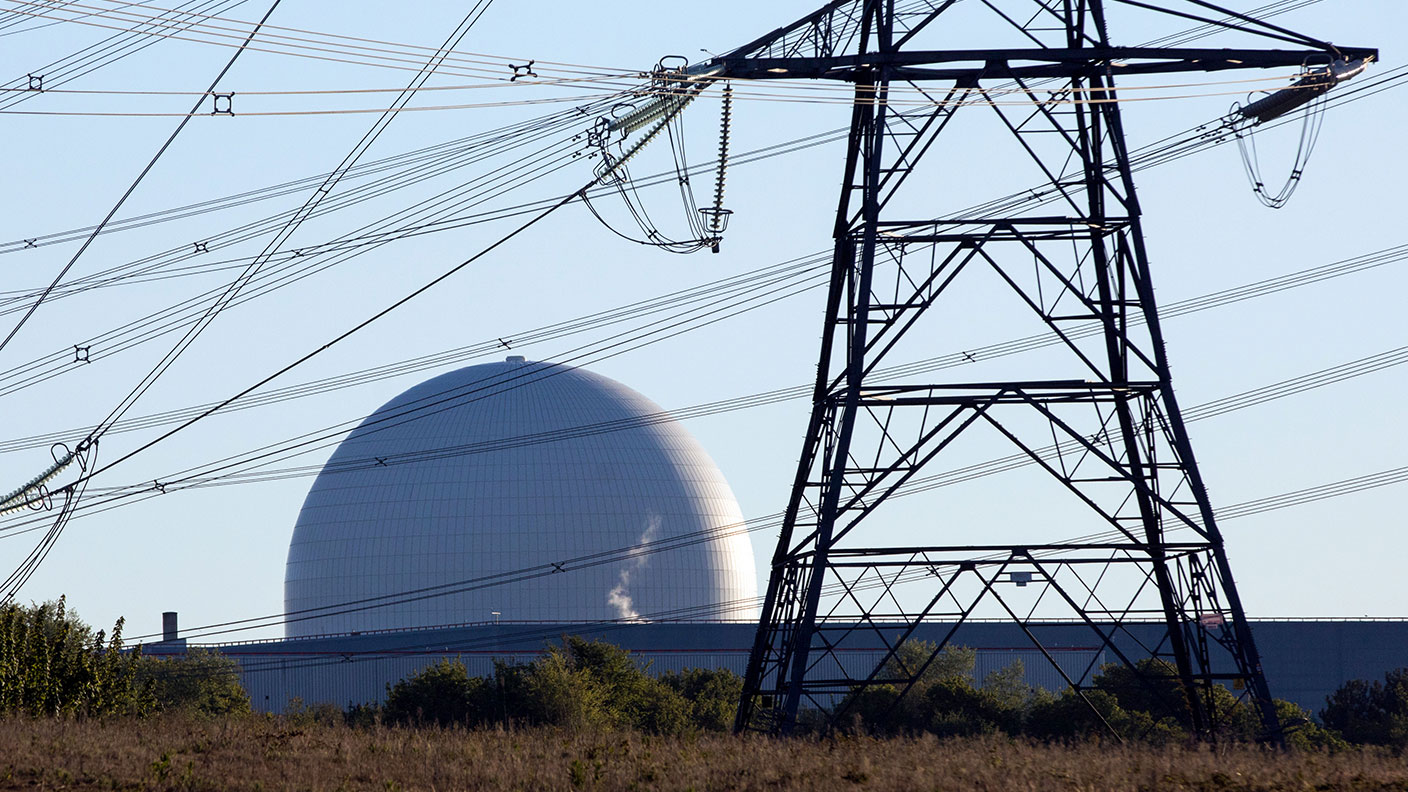Uranium prices are spiking – and conditions look ripe for a longer-term bull market
The price of uranium has hit $40 a pound for the first time in six years. And it's unlikely to be just a short-term spike. John Stepek looks at what's going on in the uranium market.


Get the latest financial news, insights and expert analysis from our award-winning MoneyWeek team, to help you understand what really matters when it comes to your finances.
You are now subscribed
Your newsletter sign-up was successful
Want to add more newsletters?

Twice daily
MoneyWeek
Get the latest financial news, insights and expert analysis from our award-winning MoneyWeek team, to help you understand what really matters when it comes to your finances.

Four times a week
Look After My Bills
Sign up to our free money-saving newsletter, filled with the latest news and expert advice to help you find the best tips and deals for managing your bills. Start saving today!
Plenty of commodities are getting close to or are already at record highs. But one perennial laggard has enjoyed rather a spike in the last week.
The price of uranium rose by around 15%, with the price hitting more than $40 a pound for the first time in six years.
That’s the sort of gain not seen since before the Fukushima disaster in Japan in 2011, which led to nuclear shutdowns in both Japan and Germany.
MoneyWeek
Subscribe to MoneyWeek today and get your first six magazine issues absolutely FREE

Sign up to Money Morning
Don't miss the latest investment and personal finances news, market analysis, plus money-saving tips with our free twice-daily newsletter
Don't miss the latest investment and personal finances news, market analysis, plus money-saving tips with our free twice-daily newsletter
So today we ask: what on earth is going on in the uranium market?
Why is the uranium price spiking?
Uranium had been ambling gently higher over the past year or so, but it’s not exactly been tin or nickel.
Instead, what’s happened is that a big fund has entered a small market and has been buying the stuff up. According to the FT and Bloomberg, the spike has been driven by a new investment trust from Canadian commodities-focused asset manager Sprott.
The new fund – the Physical Uranium Trust – was launched in July. It has been buying uranium every since, and now owns more than 24 million pounds of the stuff. (By comparison, Yellow Cake – a similar London-listed vehicle – holds about 16 million pounds).
That’s a lot for this market. And some commentators are now talking about uranium like it’s a meme stock or a cryptocurrency. A big player wading into a market with a small supply? Whoopee.
The thing is, I know that here at Money Morning, you’re all sensible long-term investors. Yes, even you at the back there. So what you want to know is: OK, uranium might have GameStop-py aspirations, but is there anything actually underpinning this?
To my mind, the answer is yes.
The long-term outlook for uranium is really only tied to one thing – the long-term outlook for nuclear power.
Conditions look ripe for a nuclear resurgence
Nuclear power is a tricky old business. We’re in the midst of an attempted energy transition right now. We are trying to go from dirty fuels (coal, natural gas, and oil) to clean ones (wind, solar and hydro).
Capacity is one issue. To an extent, that’s just a matter of time and money. You build more turbines, more solar panels, more electric car chargers – brute force can make that happen.
But a bigger problem is that the renewable fuels are mostly intermittent, whereas the dirty fuels are reliable. This is one reason (though by no means the only one) why electricity prices are shooting up to record highs across Europe right now, even as we speak. Wind generation has been weaker than expected.
You can burn coal when you like and you’ll get energy out of it. But you can’t switch the wind on and off. So your need for power and the turbine’s inclination to generate it may well not match up.
This then leads to all sorts of problems with electricity grids which I won’t go into but suffice to say, intermittency is a massive issue.
If we’re going to achieve all these “green” goals as quickly as governments have decided on, without sending energy prices through the roof or even rationing the stuff, then what we really need is a source of energy that is “always on” and yet which doesn’t emit any carbon.
Hmm. What could that be? Surely if we had a source of energy like that, we’d already have rolled it out, as it’s clearly the most logical thing to do?
And yet, nuclear power – which is always on, and which emits no carbon – is still not seen as the go-to option. This of course, is because of the politics around it and the high-profile nature of the few disasters that have happened.
As Dylan Grice wrote in MoneyWeek a few years ago, the anxieties around nuclear don’t really match up to the reality, but unfortunately it’s the anxieties that drive the policies.
The good news for uranium investors is that we do seem to be heading into one of the more pro-nuclear phases. There is now a significant pro-nuclear environmental lobby made up of people who actually care about the practicalities of hitting zero-carbon, rather than just using it as another excuse to shout about capitalism.
That – alongside surging energy prices – might make it easier for politicians to grasp the nuclear nettle.
For example, Taro Kono, one of the main contenders to be the next Japanese prime minister, and someone who has opposed nuclear in the past, has said that nuclear plants will be needed “to some degree for the country to achieve its pollution-curbing goals”, reports Bloomberg. Another possible candidate said she would “make small modular reactors a national project.”
All in all – and what with other commodities rocketing and energy prices doing the same – I suspect there’s further to go in this uranium bull market.
We’ve mentioned uranium on several occasions in the past and although it’s a relatively obscure metal there are actually quite a few ways to play it. My colleague David Stevenson wrote about them in MoneyWeek magazine earlier this year.
Hopefully you picked up a bit of exposure then. But if you didn’t, I very much doubt that it’s too late to do so yet. And to avoid missing out in future, why not subscribe to MoneyWeek now and get your first six issues free?
Until tomorrow,
John Stepek
Executive editor, MoneyWeek
Get the latest financial news, insights and expert analysis from our award-winning MoneyWeek team, to help you understand what really matters when it comes to your finances.

-
 Alphabet 'is planning a 100-year bond': would you back Google for 100 years?
Alphabet 'is planning a 100-year bond': would you back Google for 100 years?Google owner Alphabet is reported to be joining the rare century bond club
-
 Pension Credit: should the mixed-age couples rule be scrapped?
Pension Credit: should the mixed-age couples rule be scrapped?The mixed-age couples rule was introduced in May 2019 to reserve pension credit for older households but a charity warns it is unfair
-
 Investors should cheer the coming nuclear summer
Investors should cheer the coming nuclear summerThe US and UK have agreed a groundbreaking deal on nuclear power, and the sector is seeing a surge in interest from around the world. Here's how you can profit
-
 Halifax: House price slump continues as prices slide for the sixth consecutive month
Halifax: House price slump continues as prices slide for the sixth consecutive monthUK house prices fell again in September as buyers returned, but the slowdown was not as fast as anticipated, latest Halifax data shows. Where are house prices falling the most?
-
 Rents hit a record high - but is the opportunity for buy-to-let investors still strong?
Rents hit a record high - but is the opportunity for buy-to-let investors still strong?UK rent prices have hit a record high with the average hitting over £1,200 a month says Rightmove. Are there still opportunities in buy-to-let?
-
 Pension savers turn to gold investments
Pension savers turn to gold investmentsInvestors are racing to buy gold to protect their pensions from a stock market correction and high inflation, experts say
-
 Where to find the best returns from student accommodation
Where to find the best returns from student accommodationStudent accommodation can be a lucrative investment if you know where to look.
-
 The world’s best bargain stocks
The world’s best bargain stocksSearching for bargain stocks with Alec Cutler of the Orbis Global Balanced Fund, who tells Andrew Van Sickle which sectors are being overlooked.
-
 Revealed: the cheapest cities to own a home in Britain
Revealed: the cheapest cities to own a home in BritainNew research reveals the cheapest cities to own a home, taking account of mortgage payments, utility bills and council tax
-
 UK recession: How to protect your portfolio
UK recession: How to protect your portfolioAs the UK recession is confirmed, we look at ways to protect your wealth.